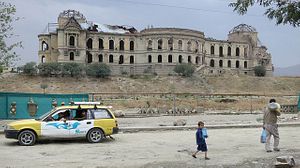Over the course of three days, the Afghan parliament dismissed six ministers and is expected to review at least eight more. While the authority to approve and dismiss ministers rests with parliament, the mass dismissal further exacerbates the preexisting struggle between the National Unity Government and the legislature, and threatens to slow the pace of government work even more.
Last week, parliament announced that it would be calling in more than 15 ministers to explain why they had not spent their development budgets. According to Tolo News, the Supreme Audit Office said that last year, “only 17 percent of 283 billion AFG [$4.3 billion] which was allocated for the ordinary budget was spent by government institutions. The SAO added that another 152 billion AFG [$2.3 billion] was allocated for development and only 46.5 percent of the money was spent.”
As Tolo News reported, Bashir Ahmad Tayyanj, an MP and spokesman from the Junbish-e-Milli party (Abdul Rashid Dostum’s party), outlined what parliament intended to do: “From Saturday until next Thursday three ministers will be summoned every day and at the end of the session ballot boxes will be put for voting whether to give them a vote of confidence or not.”
On November 12, three ministers — Foreign Minister Salahuddin Rabbani, Minister of Public Works Mahmood Baligh, and Minister of Labor and Social Affairs Nasreen Oryakhil — were dismissed.
President Ashraf Ghani and CEO Abdullah Abdullah pushed parliament to slow down. According to Mirdad Najrabi, chairman of parliament’s security commission, “President Ghani and Dr. Abdullah told MPs that their decision will deal a huge political blow to the government at this critical time and urged them to stop the process.”
The next day, three more ministers were summoned: Education Minister Asadullah Hanif Balkhi, Minister of Transportation Mohammadullah Batash, and Finance Minister Eklil Hakimi. All three did not appear before parliament but the body voted anyway. Balkhi and Batash were subsequently dismissed, while Hakimi accrued enough confidence votes to survive.
Monday, Ghani urged the fired ministers to keep working, saying in a statement after a special cabinet meeting, “Until the ruling of the Supreme Court, all the ministers should remain in their positions.”
Meanwhile, parliament called in Urban Development Minister Sayed Sadat Mansoor Naderi, Higher Education Minister Farida Momand, and Minister of Justice Abdul Basir Anwar — again, none of the three appeared before the parliamentarians. Only Momand was dismissed, bringing the total as of Monday to six sacked ministers.
Parliamentarians pointed to unspent budgets and poor performance as motivation for the votes of confidence and dismissals. Farhad Sediqi, a member of parliament, was quoted in Reuters as saying, “It is our right to decide on the ministers and we expect the government to respect that.
Abdullah’s office, like Ghani, urged the fired ministers to keep working while the relevant constitutional article (Article 92) was interpreted, presumably by the Supreme Court.
The beleaguered Afghan government has struggled to officially fill ministerial positions from the very beginning, especially in defense and intelligence. Acting ministers can’t quite bring the sense of permanence and authority to a position to the degree needed.
Meanwhile, the National Unity Government is essentially operating without a mandate. The power-sharing agreement reached between Ghani and Abdullah, put together in no small part by U.S. Secretary of State John Kerry in 2014, expired at the end of September. The agreement’s terms included electoral and political reforms, as well as parliamentary elections within the two years to make way for a Loya Jirga to amend the constitution and transform the CEO position into an honest prime ministership. But the promised electoral reforms and constitutional convention have yet to materialize.
Security in Afghanistan has deteriorated following the handover of combat operations to local forces and the drawdown of U.S. and NATO forces. At the same time, relations with Pakistan have also deteriorated and any hope for a peace settlement has all but evaporated.
With absolute uncertainty regarding how the next U.S. president will approach the Afghan problem (indeed, Afghanistan was mentioned a grand total of once during the presidential debates, by Hillary Clinton to highlight NATO’s Article 5 commitment), the powers that be in Kabul have to be more than a little nervous.
A government with a legitimacy crisis, a parliament with a grudge, and a handful of headless ministries is hardly a recipe for anything save total disaster. Then again, ministries unable to spend the funds so badly needed by the Afghan people (much of which is generously donated by foreign governments) are not what a functioning state is made of either.

































